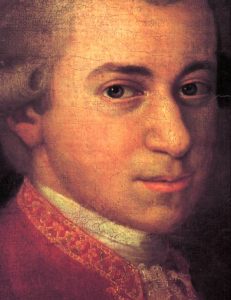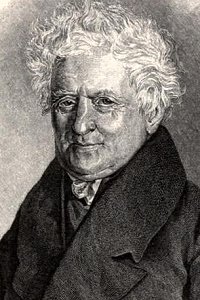
This Thursday – on September 21st – I will be giving a public lecture at UCLA’s Royce Hall entitled “Will the Real Mozart Please Stand Up?” On Saturday the 23rd, I will lead a two-hour seminar on Mozart’s opera Don Giovanni, which for logistical reasons will be held at UCLA’s law school.
I’ve said it before, and here I am, saying it again: Wolfgang Mozart was the greatest composer of operas who ever lived. You can argue the point if you like. That’s fine; just know that it is an argument that I will win. Mozart’s insight into the human condition and relationships, and his ability to portray and deepen those insights with music of unparalleled beauty and compositional virtuosity remains, to this day, second to none.
Mozart composed three different types of operas. The first was Italian language opera seria or “serious opera:” a pomp-filled and often over-blown style of opera based on myth, legend, and featuring heroic characters. The second was Italian opera buffa or “comic opera”, a genre of increasingly popular opera recently evolved from Neapolitan street theater that celebrated relatively ordinary people doing the stupid, mundane, and often very funny things real people do. Third was a genre of German-language opera called singspiel, which means, literally, “sing-recite.” It is so called because like American musical theater, singspiel features long stretches of spoken dialog.
Mozart composed seven mature operas: two serious operas (Idomeneo of 1780 and The Mercy of Titus of 1791); two singspiels (The Abduction from the Seraglio of 1782 and The Magic Flute of 1791); and three comic operas (The Marriage of Figaro of 1786, Don Giovanni of 1787, and Cosi fan tutte of 1789).

Seven mature operas might seem like an awfully small number on which to base my assertion that when it came to opera, Mozart was the GOAT (the greatest of all time). By comparison, Wagner wrote the words and music for 13 operas (or “music dramas”, as he called his later works). Puccini likewise composed 13 operas. Not including revised versions, Verdi composed 26 operas. Rossini composed 39 operas; Alessandro Scarlatti 65; Donizetti 75; Baldassare Galuppi 109; Giovanni Paisiello 110; Niccolò Piccinni 124; Antonio Draghi roughly 130. Wenzel Müller clock in as the most prolific opera composer of all time with some 170 operas to his credit.
So: with only seven mature operasto his credit, how can I even contemplate calling Mozart the operatic GOAT? The issue is quality not quantity, plain and simply.
Of all the hundreds – thousands? –- of “serious operas” that have been composed, Mozart’s Idomeneo is by every standard the greatest of them all; nothing else even comes close.
Likewise, Mozart’s The Abduction from the Seraglio and The Magic Flute are the greatest singspiels ever written; nothing else even comes close.
Mozart’s The Marriage of Figaro, Don Giovanni, and Cosi fan
As can easily be divined from my earlier comments, there are few things I enjoy teaching more than Mozart’s operas.
In the course of preparing Thursday’s lecture (during which I will play audio excerpts) and the Don Giovanni seminar (during which I will play video excerpts) I listened to and watched two performances that I must number as my favorites. Each is brilliantly conducted, and has a superb supporting cast, but feature two very different characterizations of Don Giovanni himself.……
Learn about both of the recordings on my Patreon channel.
